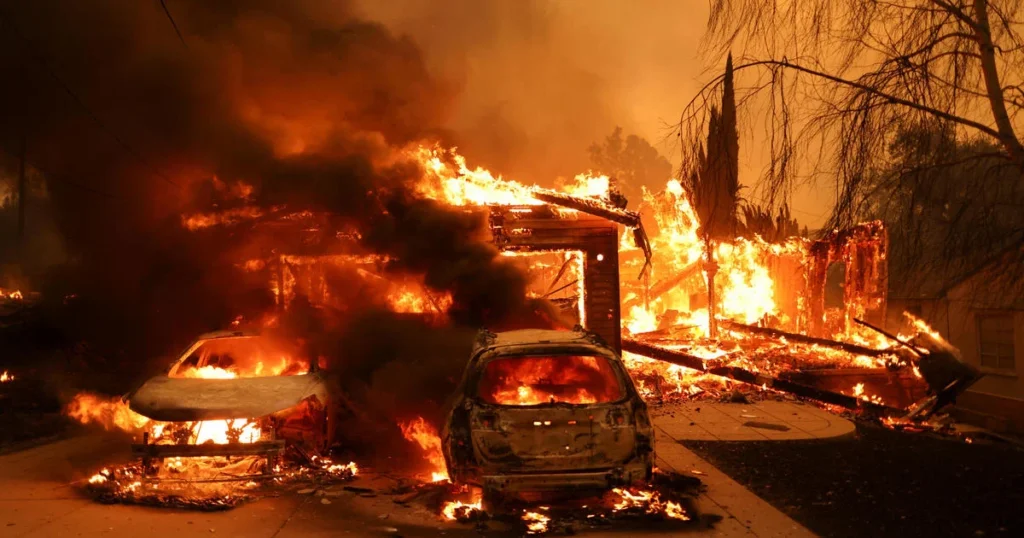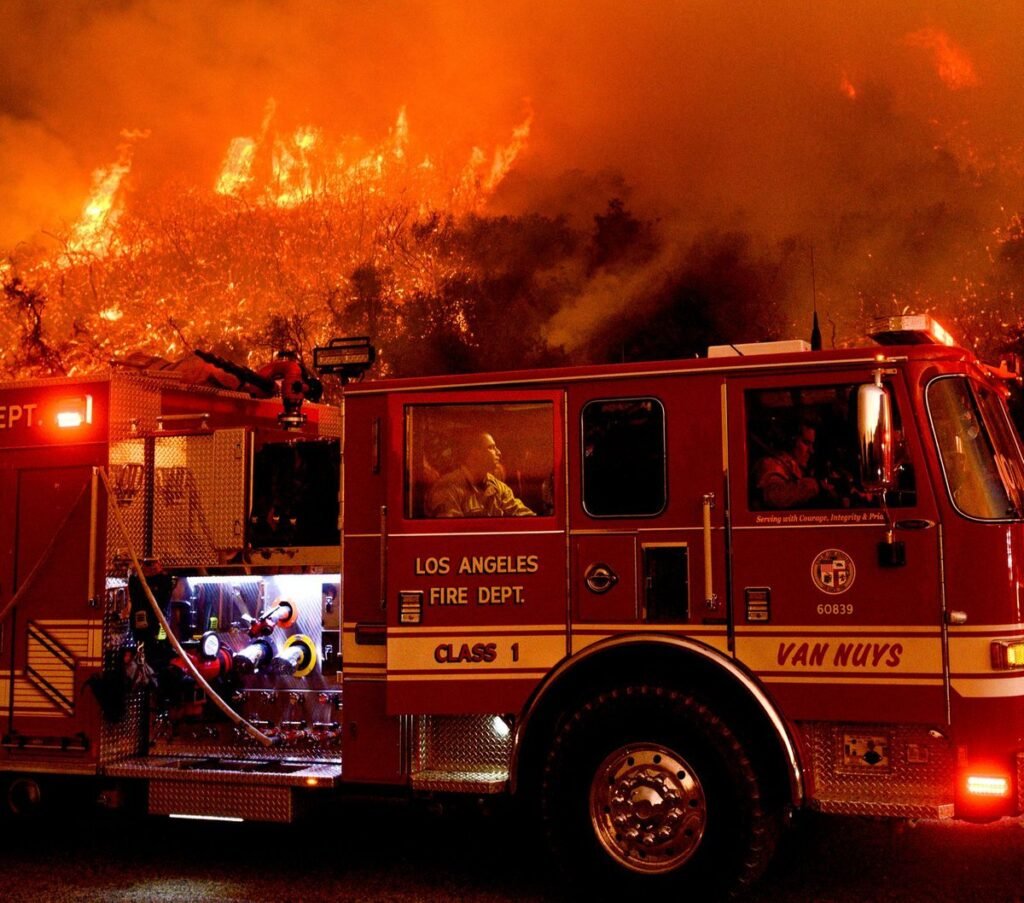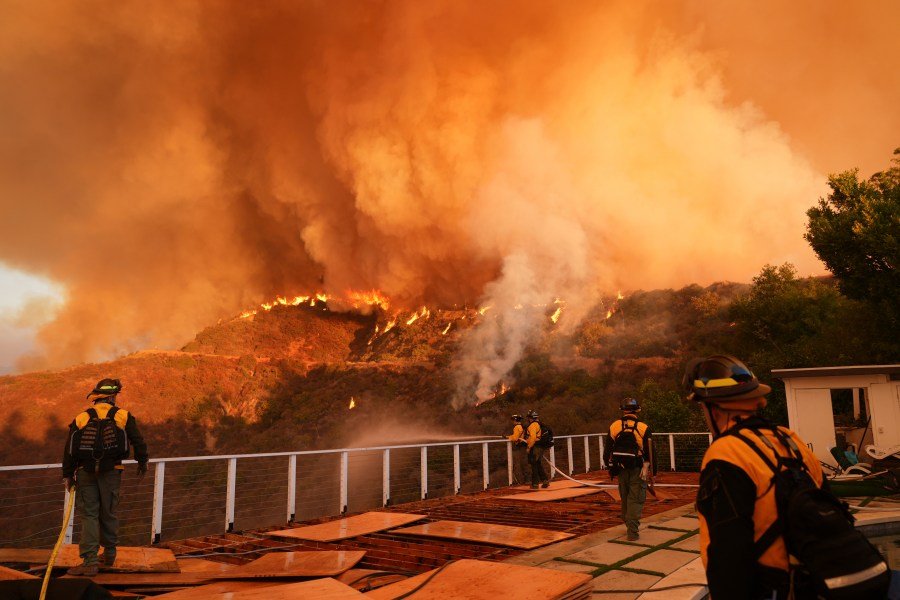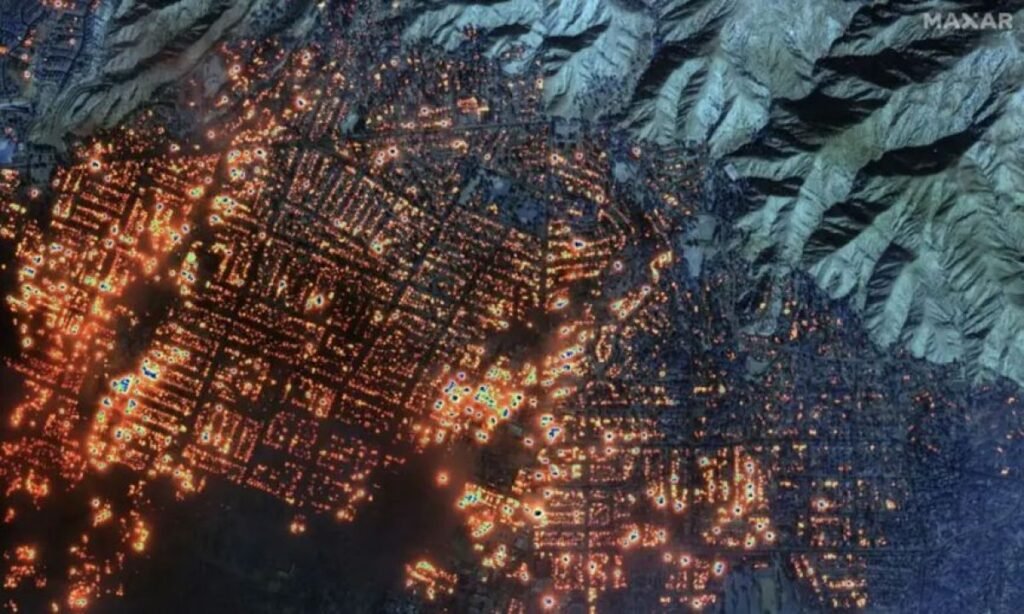The Los Angeles Fires and California’s Climate Crisis: A Failure of Policy and Prioritization
The devastating fires tearing through Los Angeles are more than a natural disaster; they are a stark reminder of the consequences of policy failures at multiple levels of governance. These blazes, which have forced the evacuation of over 130,000 residents, underscore the compounded impact of climate change, underfunded public services, and prioritization of corporate profits over public welfare. Together, these factors paint a grim picture of a state grappling with the consequences of its own decisions, where environmental negligence and economic inequities fuel a cycle of destruction.

Fires Fueled by Austerity and Corporate Influence
As Los Angeles burns, questions arise about the preparedness of city and state agencies. Years of budgetary instability have left the Los Angeles Fire Department (LAFD) and other firefighting services stretched thin. In December 2024, city fire chief Kristin Crowley warned that budget cuts had “severely limited the department’s capacity to prepare for, train for, and respond to large-scale emergencies, including wildfires.” Just weeks later, those warnings have come to fruition.
The city’s firefighting budget cuts are part of a broader pattern of underinvestment in public safety infrastructure. While the LAFD faced reduced funding, the city’s police department received a $123 million increase in 2024, despite struggles to fill vacant positions. Meanwhile, austerity measures at the state level have compounded the problem. California Governor Gavin Newsom’s 2024 budget proposed cuts to wildfire prevention and climate initiatives, citing a $46 billion state budget deficit. This approach reflects a history of budgetary whiplash, where even modest investments in climate resilience are rolled back when deficits loom. The institutional neglect is not limited to firefighting. Incarcerated individuals, paid as little as $5.80 per day, have been conscripted to fight fires—an exploitation that starkly contrasts with the wages of professional firefighters.

Such practices highlight the inequality entrenched in California’s response to natural disasters, where vulnerable populations bear disproportionate risks for minimal reward.
The Role of Climate Change and Deregulation
The increasing frequency and intensity of wildfires in California are undeniable consequences of climate change. Global warming has turned the state’s traditional wildfire season into a year-round threat, with arid conditions exacerbating the risks. Yet, while the climate crisis provides the backdrop, systemic failures have magnified its impact.
One glaring example is the for-profit energy monopoly Pacific Gas and Electric (PG&E), which has been linked to several past fires due to its failure to maintain infrastructure. The company’s corner-cutting practices highlight the dangers of prioritizing profit over safety. Despite these failures, regulatory bodies have been slow to impose meaningful accountability, leaving Californians vulnerable to preventable disasters.
At the same time, insurance companies have responded to the rising wildfire risks by increasing premiums or abandoning policyholders altogether. In 2024, 1,600 Pacific Palisades residents lost their fire insurance, leaving them financially exposed. These actions underscore the dangers of relying on private entities to manage risks exacerbated by public policy failures.
Tax Breaks and the Cost of Corporate Influence
California’s fiscal challenges are further compounded by its generous tax breaks for multinational corporations, particularly fossil fuel companies. A report by the Climate Center revealed that the state’s “water’s edge” tax loophole allows corporations to shield billions in profits from taxation. Oil and gas giants like ExxonMobil and Chevron benefit disproportionately, receiving an estimated $146 million in annual tax breaks. This lost revenue could otherwise fund climate initiatives and wildfire preparedness.
Efforts to close these loopholes have faced fierce resistance. In 2024, a bill aimed at limiting tax breaks for oil and gas companies passed but was quickly challenged in court by industry-backed groups. Meanwhile, the continued exploitation of these loopholes highlights the influence of corporate lobbying in maintaining policies that prioritize profits over public welfare.
A Systemic Failure of Prioritization
The current crisis is not merely the result of environmental factors but a failure of political and economic prioritization. Investments in firefighting and climate resilience have consistently taken a backseat to other spending priorities, including law enforcement and corporate subsidies. This misallocation of resources reflects a broader trend of neglecting long-term sustainability for short-term fiscal management.
Moreover, the reliance on incarcerated labor and underfunded public services speaks to a systemic failure to equitably distribute resources. A state with the world’s fifth-largest economy should not need to exploit vulnerable populations or cut essential services to balance its budget.
Prioritizing Climate and Community Resilience
Addressing California’s wildfire crisis requires bold action at multiple levels. First, the state must close tax loopholes that disproportionately benefit polluting industries, redirecting these funds toward climate mitigation and public safety.

Investments in wildfire prevention, including forest management and infrastructure upgrades, should be treated as non-negotiable.
Second, California must take steps to transition away from for-profit energy monopolies like PG&E. Publicly owned utilities, which prioritize safety and sustainability over shareholder profits, could provide a more reliable foundation for addressing the state’s energy needs.
Finally, a shift in budgetary priorities is essential. Adequately funding fire departments, emergency services, and climate initiatives should take precedence over increasing police budgets or providing corporate subsidies. Policymakers must recognize that an equitable and proactive approach to public safety will yield long-term benefits, both economically and socially.

The wildfires devastating Los Angeles are not merely natural disasters but the predictable outcome of systemic failures in governance and prioritization. Climate change has intensified the risks, but the neglect of public services, reliance on corporate influence, and exploitation of vulnerable populations have created a perfect storm of vulnerability.
California has the resources and expertise to address these challenges, but doing so requires a fundamental shift in values. Prioritizing community resilience, climate action, and equitable resource allocation is not only morally imperative but economically prudent. Without such changes, the cycle of disaster and recovery will continue, leaving Californians—and their environment—paying the ultimate price.

